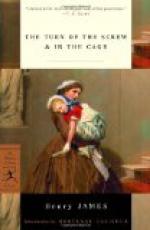Something leaped into his face. “27th—23rd? Then you’re sure? You know?”
She felt she scarce knew what—as if she might soon be pounced upon for some lurid connexion with a scandal. It was the queerest of all sensations, for she had heard, she had read, of these things, and the wealth of her intimacy with them at Cocker’s might be supposed to have schooled and seasoned her. This particular one that she had really quite lived with was, after all, an old story; yet what it had been before was dim and distant beside the touch under which she now winced. Scandal?—it had never been but a silly word. Now it was a great tense surface, and the surface was somehow Captain Everard’s wonderful face. Deep down in his eyes a picture, a scene—a great place like a chamber of justice, where, before a watching crowd, a poor girl, exposed but heroic, swore with a quavering voice to a document, proved an alibi, supplied a link. In this picture she bravely took her place. “It was the 23rd.”
“Then can’t you get it this morning—or some time to-day?”
She considered, still holding him with her look, which she then turned on her two companions, who were by this time unreservedly enlisted. She didn’t care—not a scrap, and she glanced about for a piece of paper. With this she had to recognise the rigour of official thrift—a morsel of blackened blotter was the only loose paper to be seen. “Have you got a card?” she said to her visitor. He was quite away from Paddington now, and the next instant, pocket-book in hand, he had whipped a card out. She gave no glance at the name on it—only turned it to the other side. She continued to hold him, she felt at present, as she had never held him; and her command of her colleagues was for the moment not less marked. She wrote something on the back of the card and pushed it across to him.
He fairly glared at it. “Seven, nine, four—”
“Nine, six, one”—she obligingly completed the number. “Is it right?” she smiled.
He took the whole thing in with a flushed intensity; then there broke out in him a visibility of relief that was simply a tremendous exposure. He shone at them all like a tall lighthouse, embracing even, for sympathy, the blinking young men. “By all the powers—it’s wrong!” And without another look, without a word of thanks, without time for anything or anybody, he turned on them the broad back of his great stature, straightened his triumphant shoulders, and strode out of the place.
She was left confronted with her habitual critics. “’If it’s wrong it’s all right!’” she extravagantly quoted to them.
The counter-clerk was really awe-stricken. “But how did you know, dear?”
“I remembered, love!”
Mr. Buckton, on the contrary, was rude. “And what game is that, miss?”
No happiness she had ever known came within miles of it, and some minutes elapsed before she could recall herself sufficiently to reply that it was none of his business.




